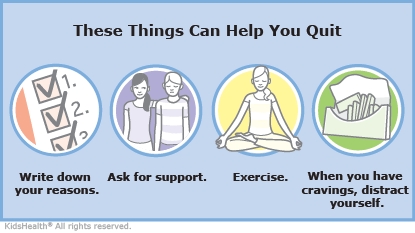Vaping nicotine is highly addictive. It also causes health problems and can make it more likely for you to be addicted to other substances later in life. Even if you don't vape every day, you can still get addicted and develop health problems. With support, you can quit! Use this information to help you.

Find Your Reasons to Quit
Quitting can help you be the best, healthiest version of yourself. Other reasons to stop include:
- You don't want to be addicted to or dependent on nicotine or anything else.
- Nicotine makes anxiety and depression worse.
- Nicotine can make it harder to learn and concentrate (especially in kids' and teens' brains).
- Vaping makes it more likely that you will try other tobacco products, like regular cigarettes, cigars, hookahs, and smokeless tobacco.
- You don't want to put toxins (poisons) in your body: The vapor in e-cigarettes contains harmful chemicals and very fine particles that are inhaled into the lungs and out into the environment.
- Vaping irritates your lungs and makes it harder to do your best in sports.
- Vaping nicotine may cause impotence (trouble keeping an erection) in men.
- Nicotine can cause sleep problems.
- You don't want to waste your money on vaping. It's expensive!
- You want to go against tobacco company advertising. Many e-cigarettes are made by the same companies that make regular cigarettes. These companies see young people, like you, as new lifetime customers.
How Do I Quit?
Decide why you want to quit and write it down or put it in your phone. Look at your reason(s) when you feel the urge to vape. Then:
- Pick a day to stop vaping. Put it on your calendar and tell supportive friends and family that you'll quit on that day.
- Get rid of all your vaping supplies.
- Text DITCHVAPE to 88709 for a free texting support program, or use an online support program such as teen.smokefree.gov/quit-vaping.
- Understand withdrawal. The signs of withdrawal are strongest in the first few days after stopping. They get better over the following days and weeks. Withdrawal can lead to very strong cravings for nicotine and also:
- headaches
- feeling tired, cranky, angry, or depressed
- trouble concentrating
- trouble sleeping
- hunger
- restlessness
- Get ready for situations that make you want to vape. These are called "triggers." If possible, avoid places and people that trigger the urge to vape. If you feel the urge to vape, try doing these things instead:
- Chew sugar-free gum, suck on a sugar-free lollipop, or drink water.
- Text, call, or hang out with a friend who will support you.
- Listen to your favorite playlist.
- Go for a walk or jog.
- Try yoga or meditation.
- Take 10 deep breaths.
- Keep your hands busy with a hobby, like drawing or making jewelry.
- Go somewhere where smoking/vaping isn't allowed.

Where can I get more information on e-cigarettes and quitting? Ask your health care provider for advice on quitting. You also can find support online at:


